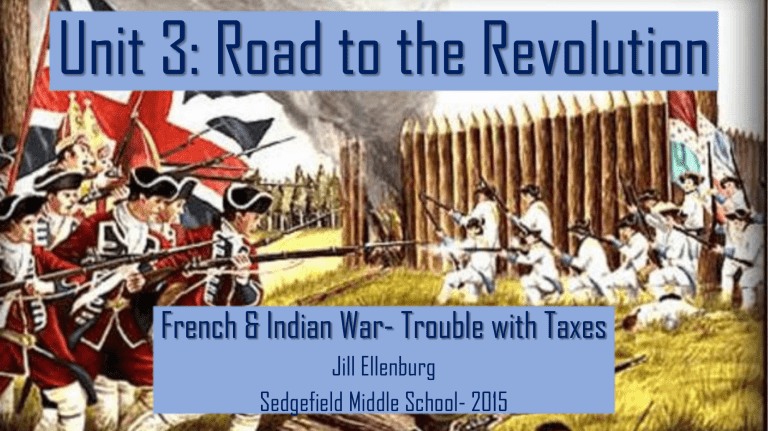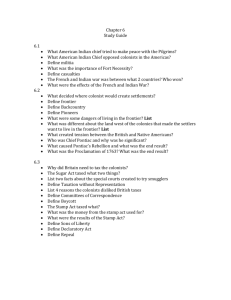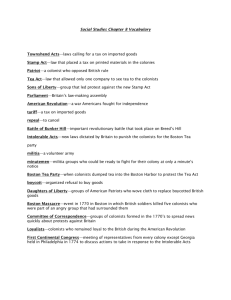Unit 3- Road to American Revolution PowerPoint

Unit 3: Road to the Revolution
French & Indian War- Trouble with Taxes
Jill Ellenburg
Sedgefield Middle School- 2015
Part 1: French & Indian War
•
French/British competing for control over European affairs
•
Britain & France BOTH want western lands of America
•
French
using it for fur trade
•
British
want to expand colonies westward
•
Last in a series of wars between Great Britain and France
•
Known as Seven Years War in Europe
•
Called French & Indian War in colonies because Britain was fighting against France and her Indian allies
French Advantage
• Organized Central government
• Alliances with most local Indians
• 6,600 well-trained troops
• Forts in GREAT locations
• Practiced Guerilla warfarelaunched surprise attacks on
British Troops
British Advantage
• Larger colonial population
• Superior Navy
• Alliance with Iroquois
• Stronger economy
War
•
1754
War breaks out
•
Early part of the War
French and
Native victories
• due to guerilla warfare
•
British= face to face combat
•
British colonial troops lost most of the battles in the first 2 years
•
France began to lose Indian allies &
British gained some
•
Turning point
British captured
Quebec
• Little military involvement
• War contributed to the Cherokee
War
SC in French/Indian War
War Ends
•
Great Britain wins
become most dominant power in the Americas
•
1763- Treaty of Paris
•
British got all lands east of the Mississippi River
•
Control of ALL of Canada
•
Took Florida from the Spanish
•
Exceptions
•
Louisiana still under French control
•
Spanish had control of the West
• British didn’t have the money to pay for the war
•
SOLUTION= raise taxes on the colonists
Part II: Trouble with Taxes
• British accumulated debt from F/I War
• Thought the colonists should pay off the debt
• Attempted to impose a series of taxes on colonists
1764
1765
Road to
Revolution
1767
1770
1773
1774
Sug ar
Townshen d Duties
Act
Stamp Act
(march 22)
Stamp Act
Congress
Tea Act
Boston Tea
Party
Massac re
Continental Congress
Sugar Act- 1764
• Required colonists to purchase sugar/molasses from British merchants
• Britain started cracking down on smuggling
• Anyone accused of smuggling tried in a court with British judges NOT colonists
• Often found guilty judges got 5% of seized cargo
• VIOLATED colonists right to jury of peers as stated in the Magna Carta
Reaction to the Stamp
•
Act
Boycott (refuse to buy) of British merchandise
• Stamp Act Congress
• Meeting of reps from 9 colonies opposing the
Stamp Act
• “No Taxation without Representation”
• SC sends 3 delegates
• Christopher Gadsden
• John Rutledge
• Thomas Lynch
• Eventually led British to repeal the Stamp Act
(March, 1766)
• Patriotic group that protested abuses by the
British government
• Used violence to scare away tax collectors
• Tar & feathering
Christopher
Gadsden
• Leader of the “Sons of Liberty” in SC
• Boldly spoke out against Stamp Act
• Boldly encouraged boycotting British goods through persuasion and intimidation
• Became a leading proponent of going to war with England
• At Stamp Act Congress, Gadsden expressed his vision of a United America
“There Ought to be no New England man, no New
Yorker…but all of us AMERICANS”
Townshend Duties-
1767
• A series of new taxes on imported goods
• Paper, Paint, Glass, Tea
• Money was used to pay salaries of colonial governors
• Sons of Liberty began attacking houses of tax collectors
• Caused G.B to repeal the Townshend duties except the tax on TEA
Boston Tea Partydec 16, 1773
• Sons of Liberty dressed as Indians and raided a docked British Tea Ship
• Dumped 342 Chests
(90,000 lbs.) of tea into the Boston Harbor
• Cost East India
Company thousands of dollars
Charleston Tea
Party
(Dec 2
nd
, 1773)
• British ship, The HMS London , arrived in Charles Town with
257 chests of tea
• Assembly decided to store the tea in the basement of the
Exchange building
• Sold it to pay for war costs
Coercive/Intollerable
Acts- 1774
1. Boston Harbor was shut down until Britain was paid for the tea
2. The Massachusetts gov. shut down
3. Trials against British Soldiers were to be held in
England
4. The Quartering Act – Forced Colonists to allow
British Soldiers to stay with them if necessary
First Continental
Congress- 1774
• All colonies (except Georgia) send delegates to Philadelphia
• Henry Middleton of SC elected pres. Of congress
• Wanted Britain to overturn all laws passed since 1763
• If G.B did cooperate, colonies would boycott ALL British goods
• If GB STILL didn’t cooperate, colonies would STOP shipping
American goods to both GB and the Caribbean Islands
Second Continental
Congress- 1776
• SC sends 5 delegates:
• Edward Rutledge
• Thomas Lynch (was too sick to sign and died before he could)
• Thomas Lynch, Jr.
• Arthur Middleton
• Thomas Heyward, Jr.
• After much discussion, agreed on a complete split
Declaration of
Independence
• Thomas Jefferson drafted a document announcing a
DECLARATION OF
INDEPENDENCE
• The signing led ultimately to the
AMERICAN REVOLUTION



